Cyber Security Course in Singapore
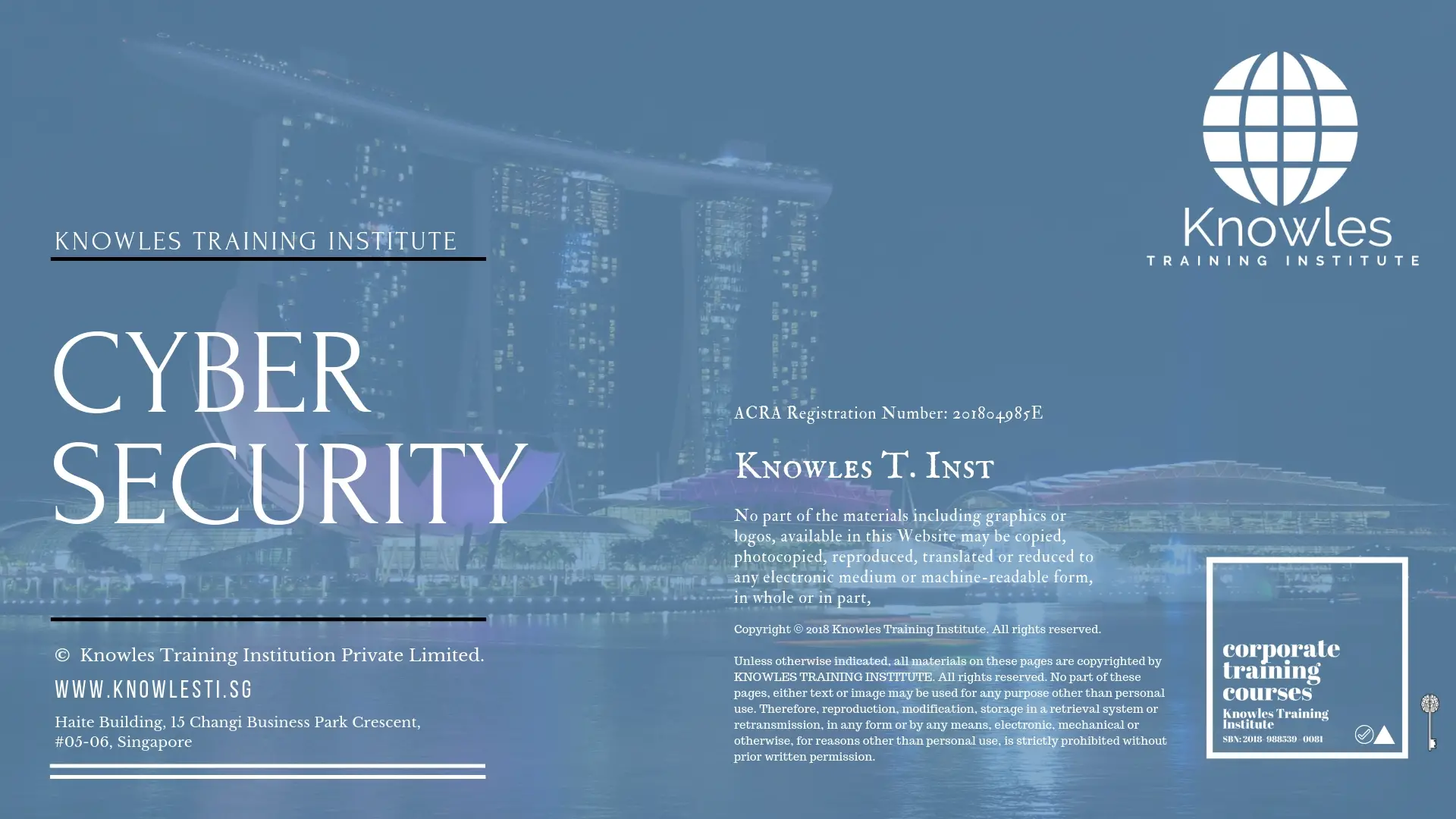
About This Cyber Security Training Course
Cyber Security Course in Singapore
An organization as private and sensitive as a business company which relies on computer software requires a thick wall of cybersecurity measures against cyberattacks. Without a cybersecurity system, confidential files and personnel data, among a few, could be easily acquired by the wrong hands with a mind for illegal computer hacking.
Who Should Attend This Cyber Security Workshop
This Cyber Security workshop is ideal for anyone who would like to gain a strong grasp and improve their Cyber Security.
All Staff Within An Organisation
Managers
Team Leaders
Executives
Assistants
Officers
Secretaries
Group Size For This Cyber Security Training Program
The ideal group size for this Cyber Security course is:
Minimum: 5 Participants
Maximum: 15 Participants
Course Duration For This Cyber Security Skills Course
The duration of this Cyber Security workshop is 2 full days. Knowles Training Institute will also be able to contextualised this workshop according to different durations; 3 full days, 1 day, half day, 90 minutes and 60 minutes.
2 Full Days
9 a.m to 5 p.m
Cyber Security Course Benefits
Below is the list of course benefits of our Cyber Security course
- Learn the key concepts of cloud technology and its uses in businesses
- Effectively use which cloud computing services and apply it on your business
- Be equipped with the knowledge of the different architectural designs of cloud services
- Adapt to use public or private cloud technology as needed by a business model
- Create and deploy Cloud Community services and Hybrid cloud technology in your environment
- Know the different models in cloud services and which to use in a company
- Grasp the different advantages when using Cloud Software as a Service in your company
- Effectively use infrastructure as a Service and know the benefits of selecting this service
- Adapt to different forms of cloud services available and know its advantages
- Comprehend how using virtualization can provide cost effective alternatives
- Be ready to adapt on the different VMware in building a cloud service
- Be prepared to deploy a VMWare cloud software and learn how to maintain it
Cyber Security Course Objectives
Below is the list of course objectives of our Cyber Security course
- Discuss the fundamentals of Cyber security and how it is being used
- Present how cybercrimes are made today and the vulnerability of online citizens
- Describe how to create a cyber-security system that can be used to protect files
- List the different counter-measures that can be used to protect against cyberattacks
- Illustrate the ways to protect the networks communication systems
- Explore the ways encryption can protect a user from cyber thefts
- Distinguish the usage of symmetric and asymmetric key systems for cybersecurity
- Explain the ways to increase security by encrypting a network
- Enumerate the different encryption methods and learn how to apply each
- Distinguish and apply the cyber security concepts of Freshness and Integrity
- Present the different authentication methods that may be used as added security
- Model the way to create and apply a firewall in a network
Course Content For This Cyber Security Training Course
Below is the list of course content of our Cyber Security training course
- The Fundamentals of Cyber Security and its relevance today
- Cyber-attacks and the vulnerability of cybercrimes in a business today
- Setting up an extensive and impenetrable cyber security
- Counter measures to cyber-attacks and how to protect against information thefts
- How to protect the various communication networks from cyberattacks
- Fundamentals on Encryption and how it is used in cyber security
- Using Symmetric and Asymmetric key systems on the networks
- How to implement encryption in an existing network
- Understanding Link Layer, Network Layer and Application Layer encryption
- Learning the concepts of Freshness and Integrity in Cyber security
- Authentication methods commonly used in cyber security networks
- Applying a firewall to protect your network from cyber attacks
Cyber Security Value Added Materials
Each participant will receive the following materials for the Cyber Security course
Cyber Security Learner’s Guide
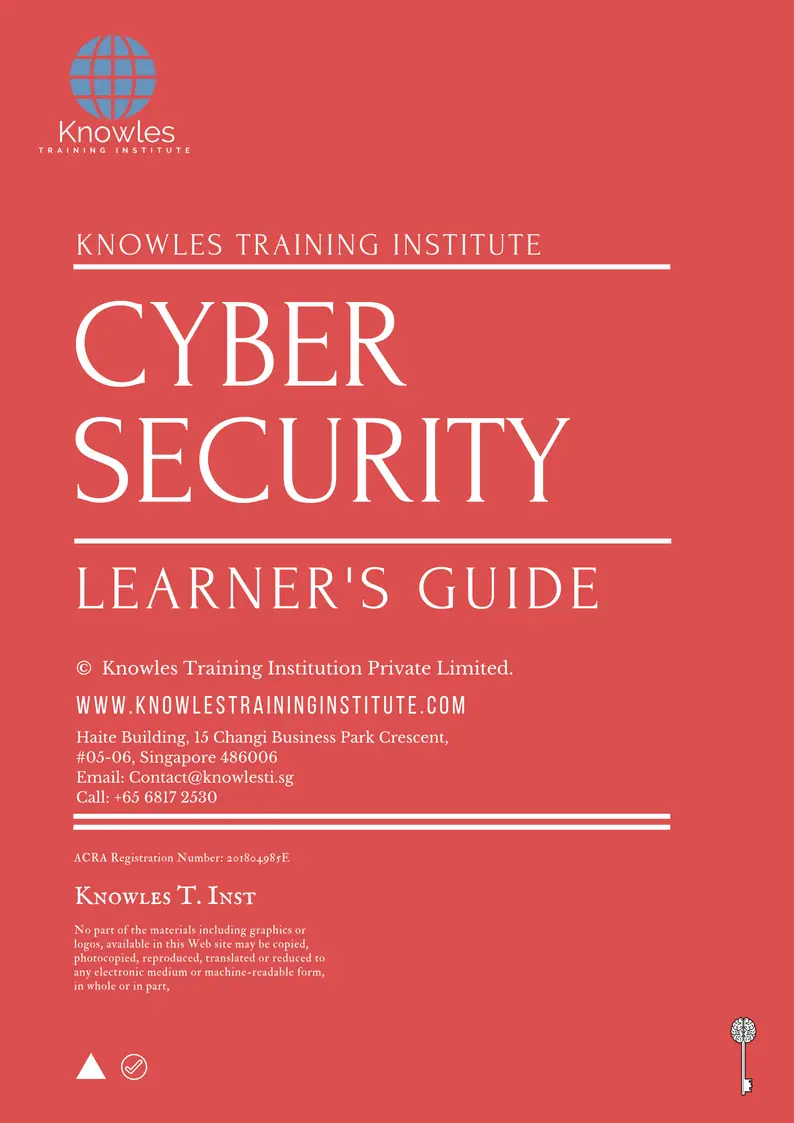
Cyber Security Key Takeaways Notes
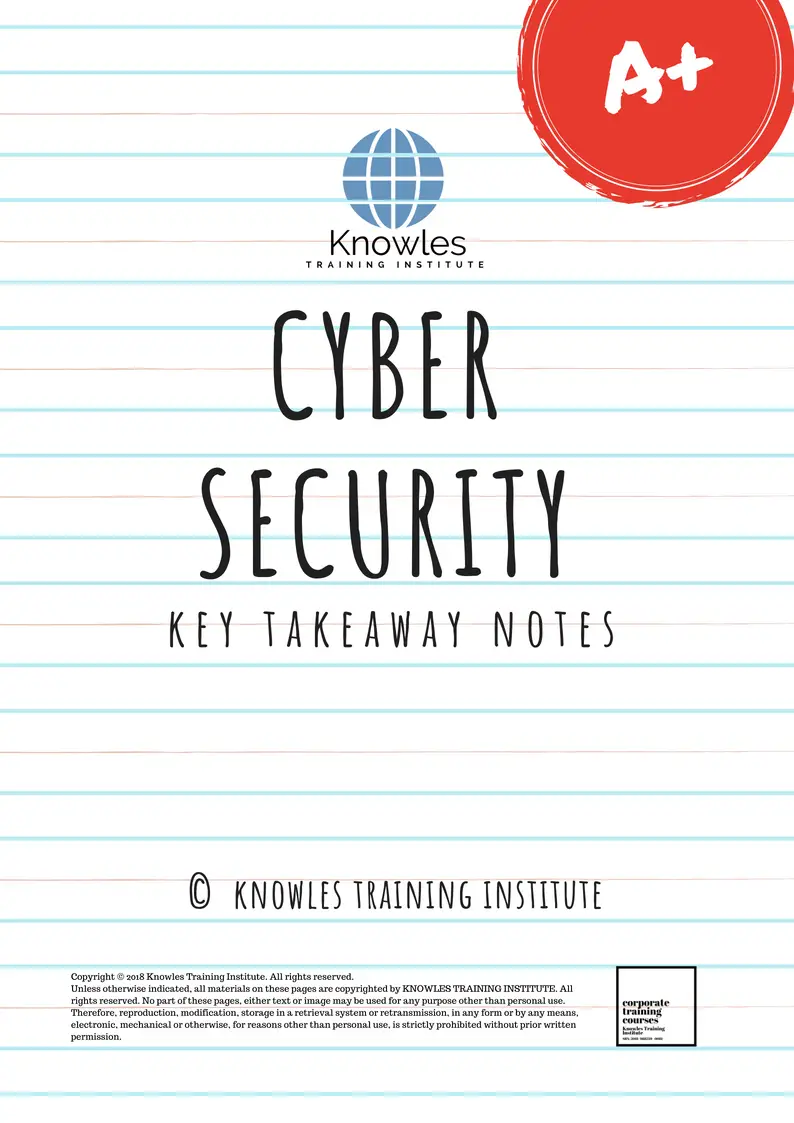
Cyber Security Essentials Ebook
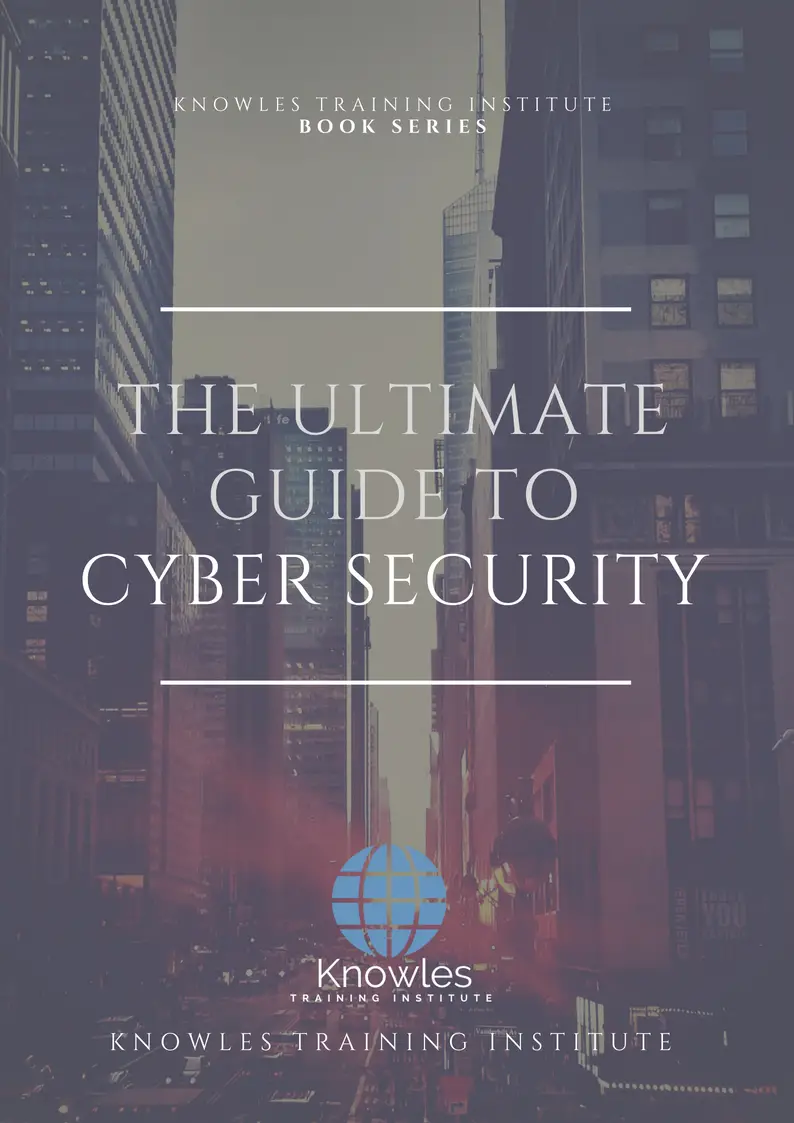
Cyber Security Course Handouts
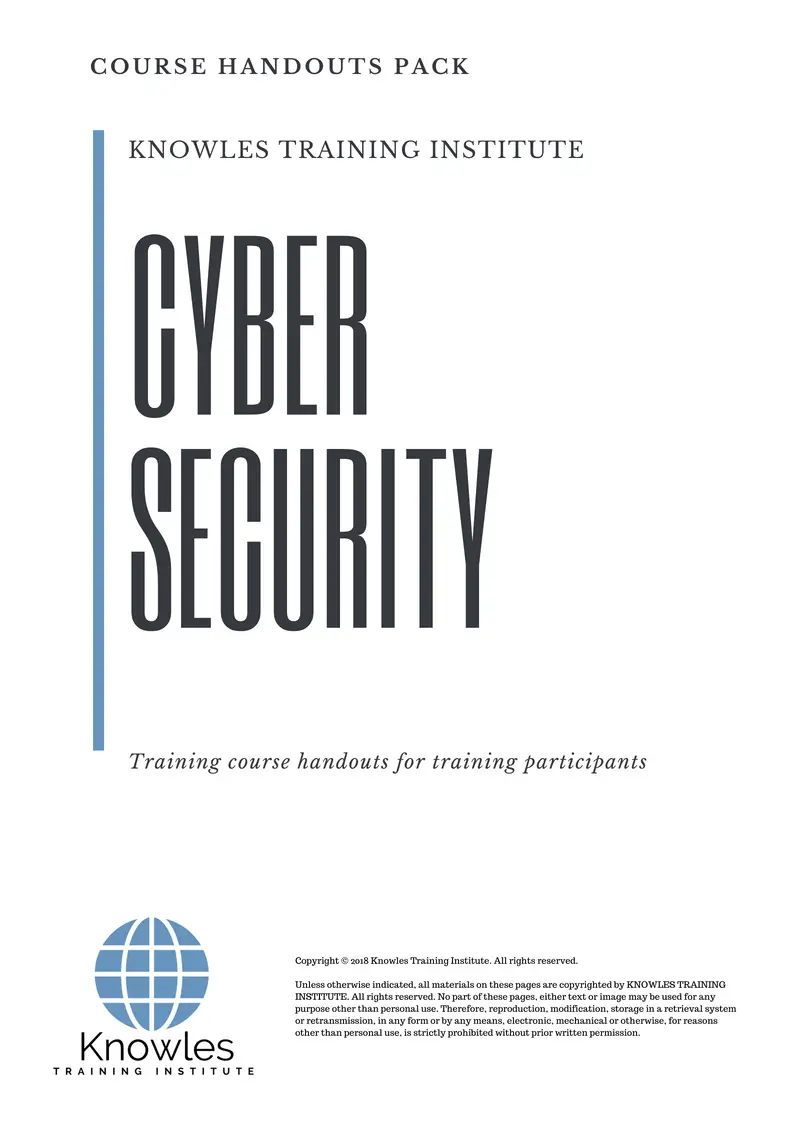
Cyber Security 30-Day Action Plan
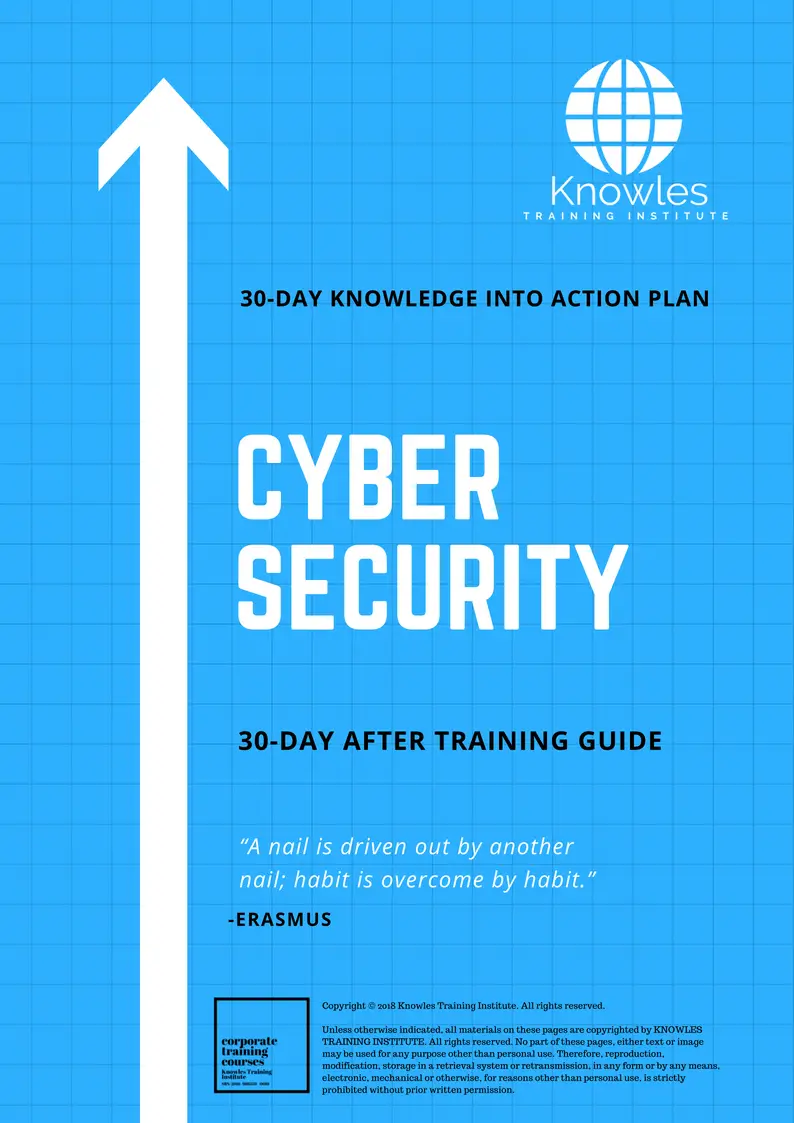
Cyber Security MindMaps Pack
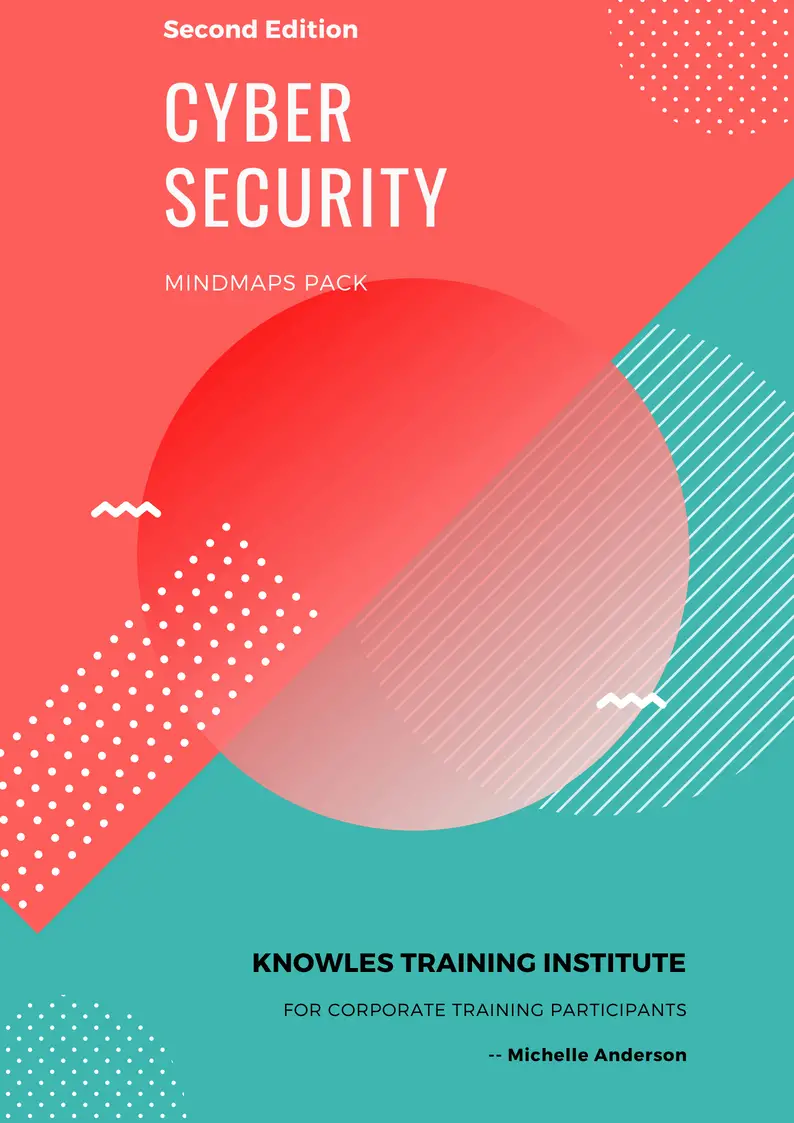
Cyber Security PPT Slides Used During Course
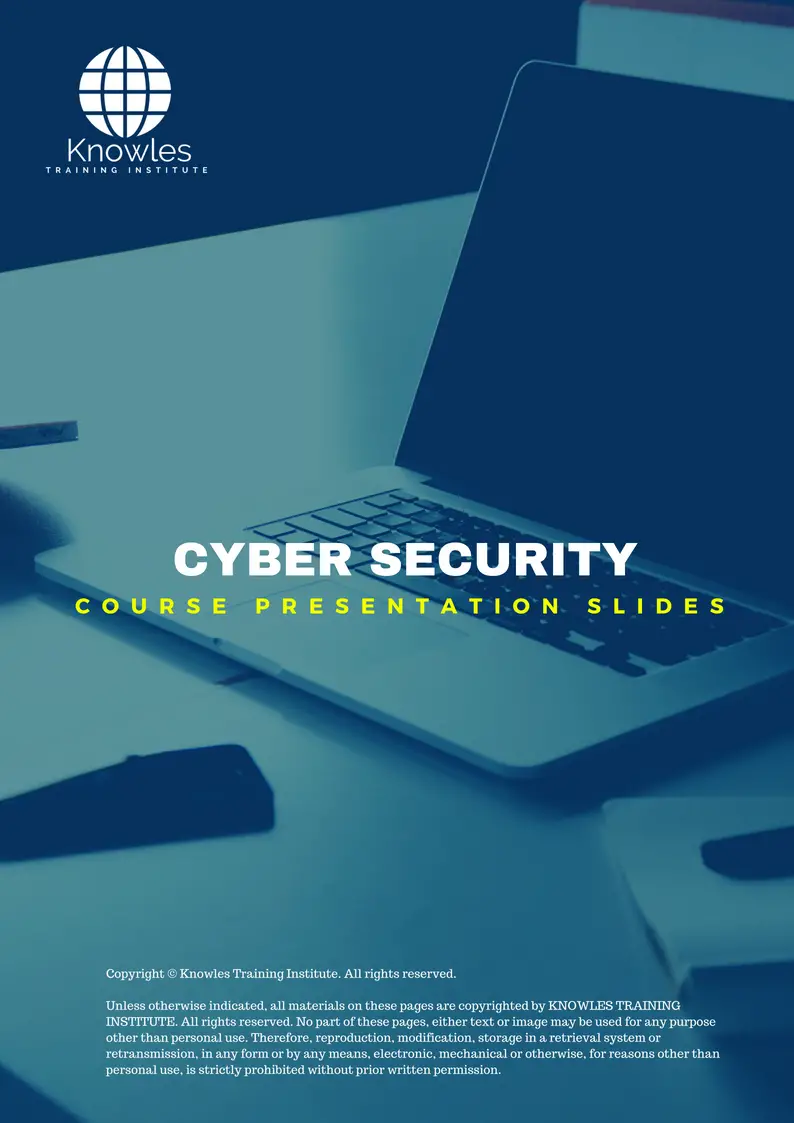
Cyber Security Long-Term Memory Flashcards Pack
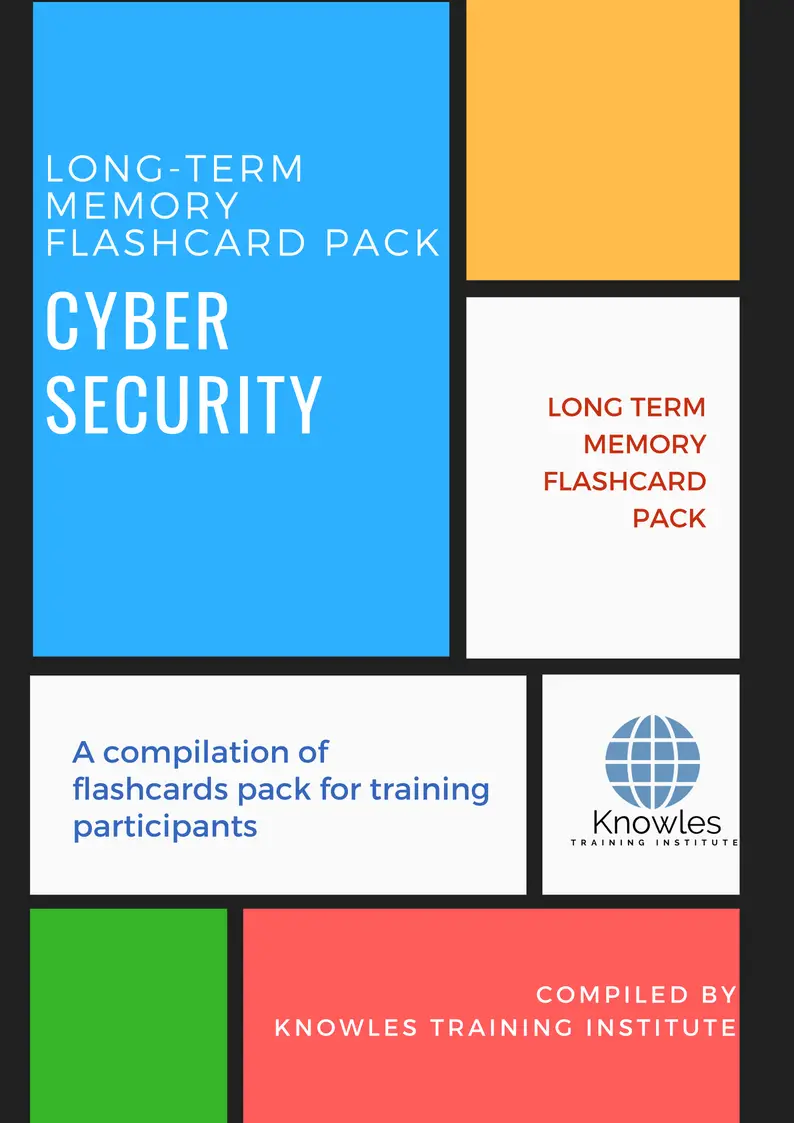
Cyber Security E-Learning Course
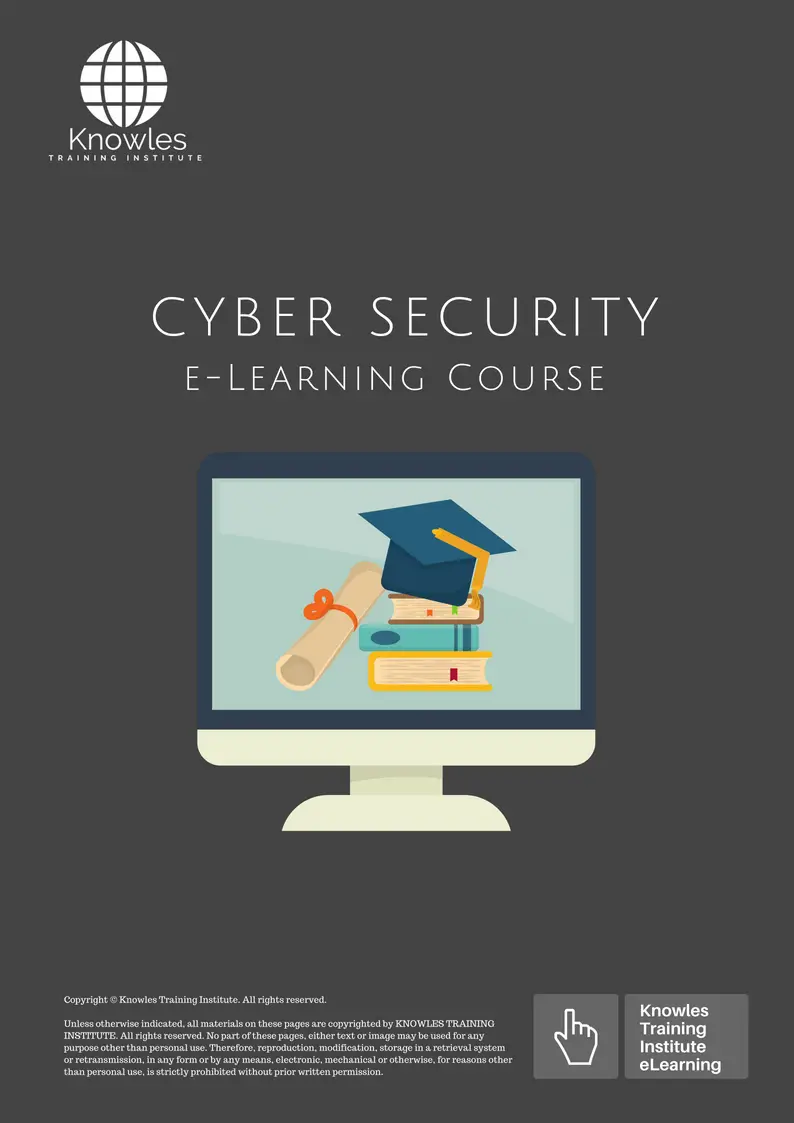
Cyber Security Online Video Course

Cyber Security Essentials Audiobook

Cyber Security Infographics Pack
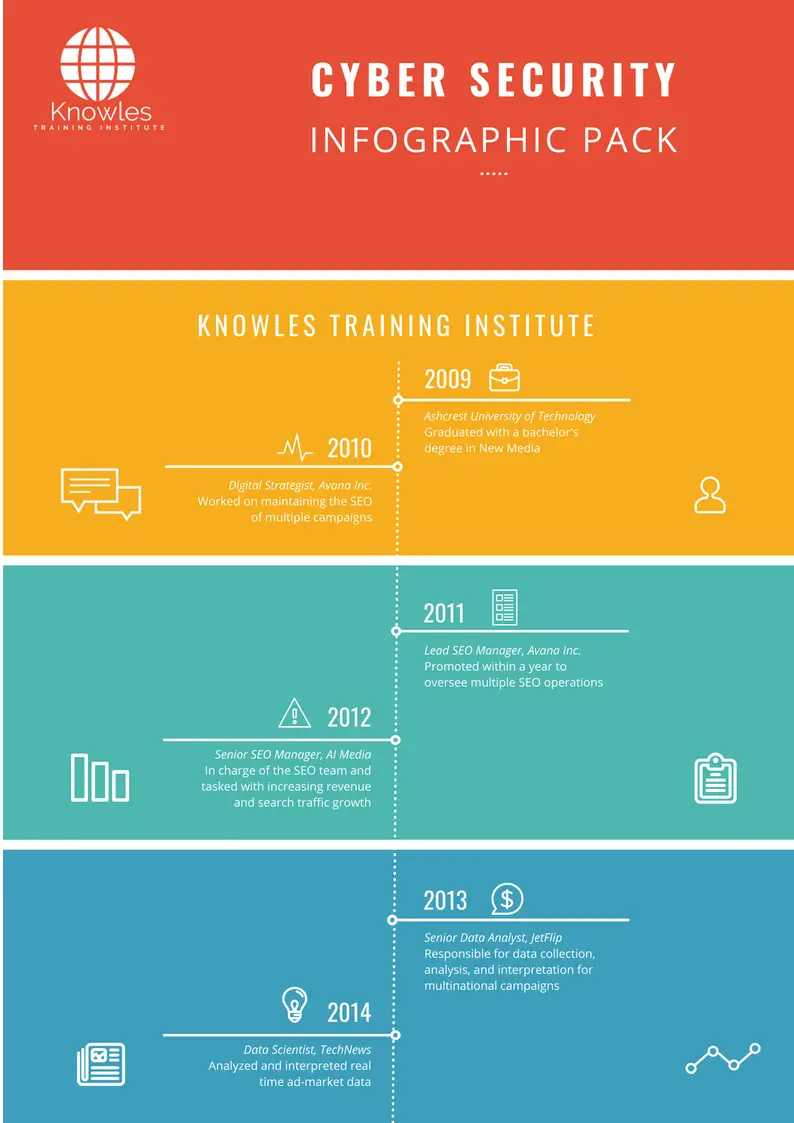
Cyber Security Certification
Each course participant will receive a certification of training completion

Course Fees
There are 3 pricing options available for this Cyber Security training course. Course participants not in Singapore may choose to sign up for our online Cyber Security training course.
SGD 1,334.96 For a 60-minute Lunch Talk Session.
SGD 584.96 For Half Day Course Per Participant.
SGD 884.96 For 1 Day Course Per Participant.
SGD 1,184.96 For 2 Day Course Per Participant.
Discounts available for more than 2 participants.
Course Discounts, Fundings & Subsidies
We have the following discounts, fundings & subsidies for this Cyber Security training course

Upcoming Cyber Security Training Course Schedule
Contact us for the latest Cyber Security course schedules:
Phone: +65 6714 6663
Email: contact@knowlesti.com
Message:
Download Cyber Security Course Brochure
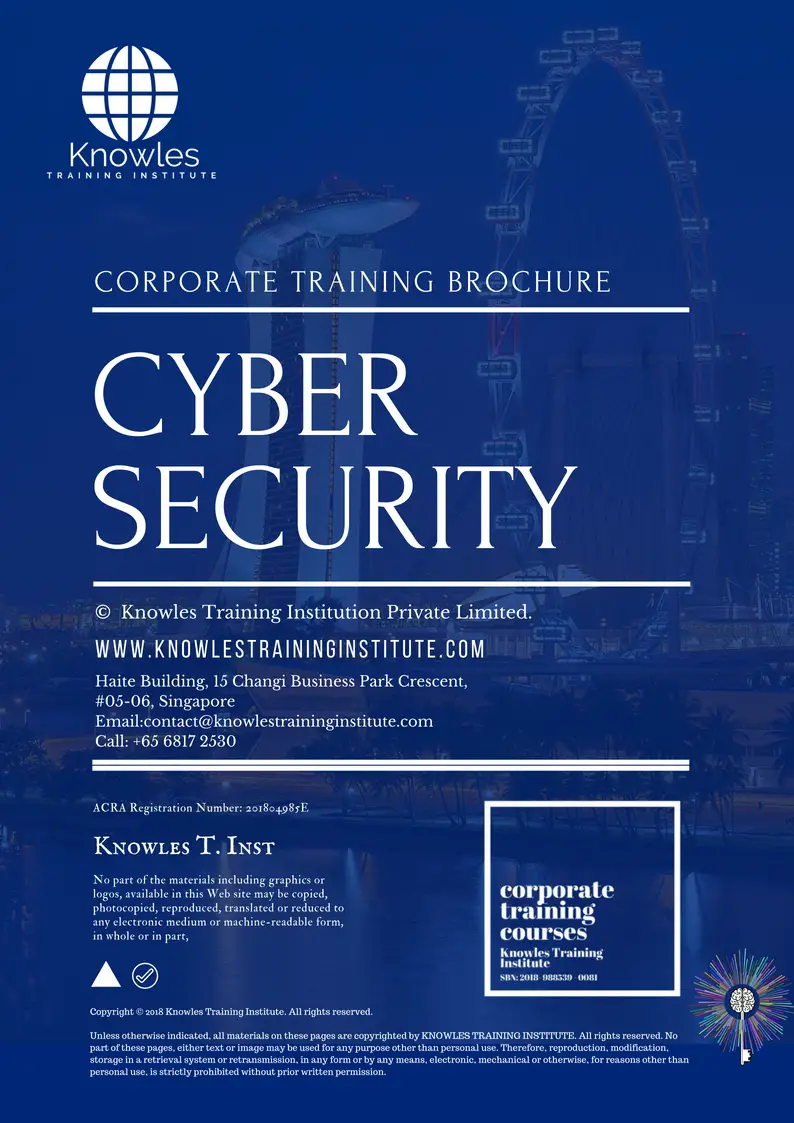
Request for this Cyber Security course brochure. Fill up the short information below and we will send it to you right away!
Post-Training Support: A vast majority of training does not have any effect beyond 120 days. But to work, training has to have a strong pre- and post-training component. Post-training reinforcement consequently helps individuals to recall the understanding and ask questions.
Blended Learning: Learning does not occur in the classroom. Virtually everybody prefers distinct ways of learning. Successful learning should have a multi-channel, multi-modal strategy.
We Understand The Industry: Similarly, we’ve got a profound comprehension of the business, business design, challenges, strategy and the that our participants are in and have designed the courseware to cater to their professional needs.
Course Content: Knowles Training Institute’s material is relevant, of high quality and provide specific learning outputs. As a result, Participants will leave the training course feeling as they have gained a strong understanding and will also be in a position to execute what they have learned sensibly.
Course Development — The workshop modules follow a systematic and logical arrangement. Therefore, this structure helps to ensure that the course material allows the facilitators to deliver the course in a logical arrangement. Consider the subjects as building bricks into learning, our facilitators slowly build towards a comprehensive picture of this entire topic.


Course Enquiries

Fill up the form and we will get back to you in less than 1 working day.
Alternatively, give us a call to have one of our training consultants contact you. Our corporate training courses can be contextualized to meet your organization’s training needs. Leverage on our large pool of professional trainers and consultants for your organization’s training needs.
Office Address: 60 Paya Lebar Rd, #07-54 Paya Lebar Square, Singapore 409051
Office Phone: +65 6714 6663
Email: contact@knowlesti.sg
We Guarantee 100% Privacy. We Respect Your Privacy. Your Information Will Never Be Shared.
Questions
Cybersecurity concerns the collection of technologies, systems, and practices made to protect devices, programs, networks, and data from attack or unauthorized access. Cybersecurity and Information technology security is synonymous with each other.
Cybersecurity is the practice of defending systems, networks, and programs from online attacks from hackers or other government entities. These cyberattacks usually have the aim of accessing, changing, or damaging sensitive information; extracting money from users; or disrupting normal business processes.
There are hundreds of job titles in cybersecurity, but some of the top positions include:
- Security Analyst.
- Security Engineer.
- Security Architect.
- Security Administrator.
- Security Software Developer.
- Cryptographer.
- Cryptoanalyst.
- Security Consultant.
Cyber Security can be classified into types of techniques used to prevent the stolen or assaulted data. Some types of Cyber Attacks include:
- Denial of Service Attack (DoS)
- Malware
- Phishing
- Spoofing
- Worm virus
- Hacking
- Ransomware
- Spamming
Cybersecurity degrees are more often than not more challenging than non-research type majors, such as business or humanities majors. However, they are usually not as tricky as degrees in lab-intensive areas or research, such as science or engineering.
Some of the common types of cyber attacks include:
- Malware – A virus that is a malicious software which encompasses a wide range of software such as spyware and worms
- Phishing
- Man-in-the-middle attack
- Zero-day exploit
- DNS Tunneling
- A denial-of-service attack (DOS)
- SQL injection
Luckily for cybersecurity professionals, this generates a high demand for jobs. According to the US Bureau of Labor Statistics (BLS), Information Security Analysts is projected to increase by a faster-than-average 37 per cent over ten years.
Cybersecurity is critical because it incorporates everything that pertains to preserving our sensitive data, individually identifiable information, protected health data, intellectual property such as patents, personal information, and governmental and industry information systems from theft and corruption of data attempted.
Cybersecurity is the protection of internet-connected systems, including hardware, software and data, from cyberattacks. In the computing world, security comprises cybersecurity and physical security — both are used by enterprises to guard against unauthorized access to data centres and other computerized systems.
Here are some skills helpful for cybersecurity professionals:
- Intrusion detection.
- Malware report and reversing.
- Programming know-how.
- Being aware of the mindset like a black hat.
- Risk report and mitigation.
- Cloud security.
- Security analysis.
- Establishing a well-rounded skillset.
Most of the entry-level cybersecurity jobs do not demand coding skills. Nevertheless, being well-versed in coding may be required in some mid-level and upper-level cybersecurity positions. One will be qualified for these positions after building a few years of experience.
While a career in cybersecurity can be stressful, the job is also gratifying. The duties of a cybersecurity professional vary from job to job, but the role can be generalized as to protect an organization’s data from being endangered by an attack.
Cybersecurity is the practice and study of defending systems, networks, and applications from digital attacks. They are usually extorting money from users; directed at altering, changing, or destroying sensitive information; or disrupting normal organization processes.
Cybersecurity risk is the probability of vulnerability or loss resulting from a cyber-attack or data breach on the organization. Cyber experts use threat intelligence tools and security programs to highlight potential attack venues in order to reduce cyber risk.
Cybersecurity measures and procedures are part of the banks’ overall protection approach that incorporates teams of security experts that monitor transactions, detect and deter fraud, and maintain the safety of customer’s accounts from being compromised.
There are three broad types of cybersecurity: End-point, Network, and Internet security (the cybersecurity subcategory). The other numerous types of IT security can be categorized under the umbrella of these three types.
Here are some of the most significant IT security breaches in history:
- 145 million users – Equifax.
- 145 million users – Heartland Payment Systems.
- 134 million credit cards exposed – Target Stores.


